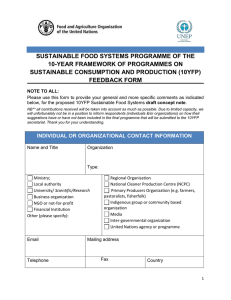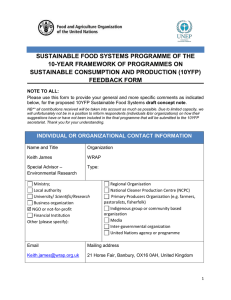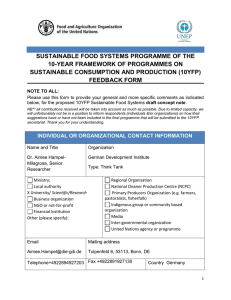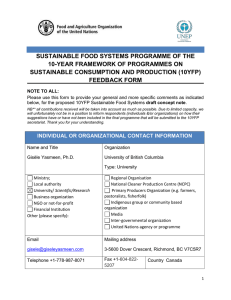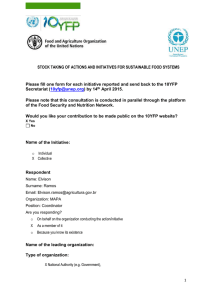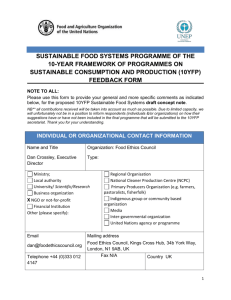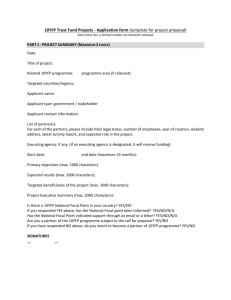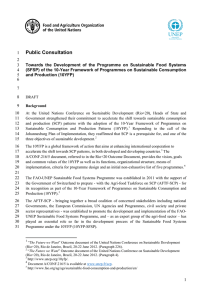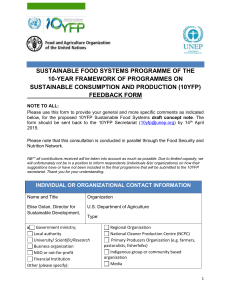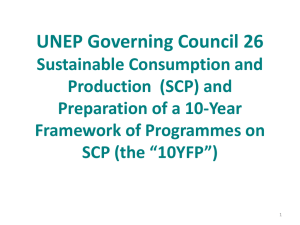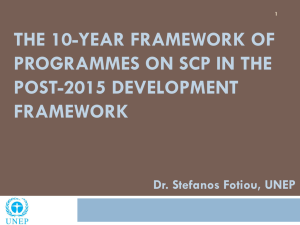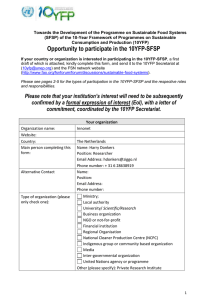SUSTAINABLE FOOD SYSTEMS PROGRAMME OF THE 10-YEAR FRAMEWORK OF PROGRAMMES ON
advertisement
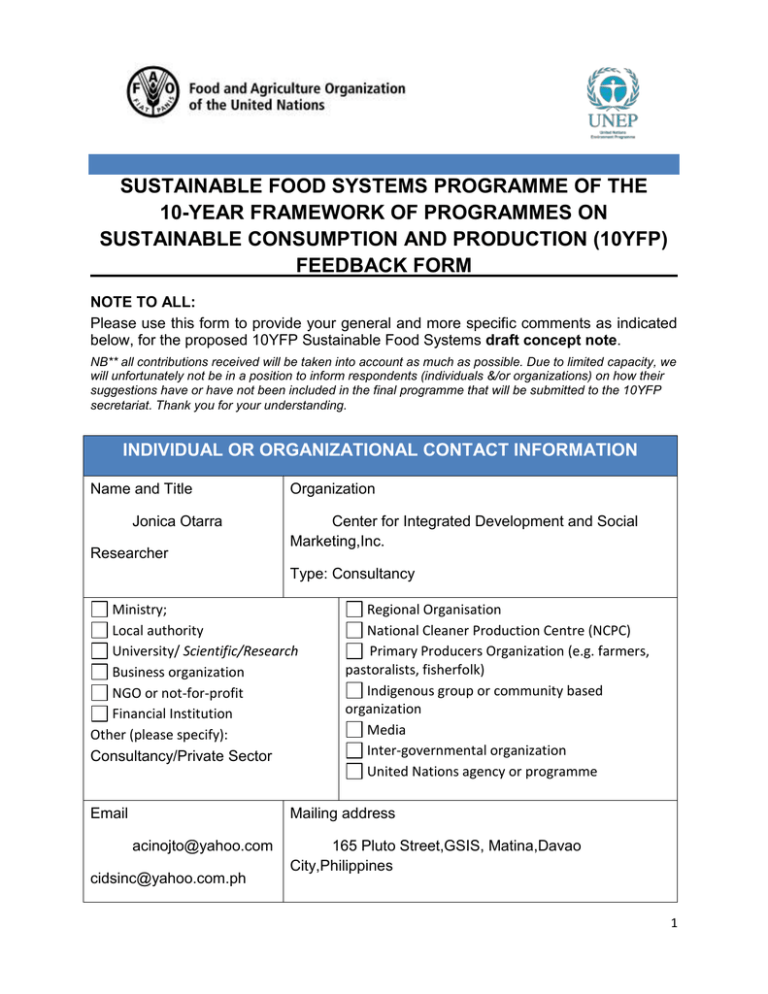
SUSTAINABLE FOOD SYSTEMS PROGRAMME OF THE 10-YEAR FRAMEWORK OF PROGRAMMES ON SUSTAINABLE CONSUMPTION AND PRODUCTION (10YFP) FEEDBACK FORM NOTE TO ALL: Please use this form to provide your general and more specific comments as indicated below, for the proposed 10YFP Sustainable Food Systems draft concept note. NB** all contributions received will be taken into account as much as possible. Due to limited capacity, we will unfortunately not be in a position to inform respondents (individuals &/or organizations) on how their suggestions have or have not been included in the final programme that will be submitted to the 10YFP secretariat. Thank you for your understanding. INDIVIDUAL OR ORGANIZATIONAL CONTACT INFORMATION Name and Title Jonica Otarra Researcher Organization Center for Integrated Development and Social Marketing,Inc. Type: Consultancy Ministry; Local authority University/ Scientific/Research Business organization NGO or not-for-profit Financial Institution Other (please specify): Consultancy/Private Sector Email Regional Organisation National Cleaner Production Centre (NCPC) Primary Producers Organization (e.g. farmers, pastoralists, fisherfolk) Indigenous group or community based organization Media Inter-governmental organization United Nations agency or programme Mailing address acinojto@yahoo.com cidsinc@yahoo.com.ph 165 Pluto Street,GSIS, Matina,Davao City,Philippines 1 Telephone 6663406 63 921 Fax Country Philippines 63 082 2962963 2 Instructions: Please provide your feedback for each of the proposed questions on the Sustainable Food Systems Programme by completing the following matrix. If you do not have any comments please check the “No comment” box. General “Sustainable Food Systems” Programme Feedback Feedback Question Having reviewed the draft Concept Note, does it adequately identify the main global challenges for sustainable food systems? Having reviewed the proposed Vision and Goal, do they adequately address the needs of the global programme? Having reviewed the proposed objectives, do they adequately address the needs of the global programme? Select One Provide Your Additional Comments Yes No Yes No Yes No 3 Provide Your Feedback Programme Objectives Programme Objective 1: Raise awareness on the need to shift to sustainable food systems and applying a systems approach to addressing food security and nutrition. No Comment Suggested Text Change Additional Feedback (check the box) (Please insert your text) (Please insert your text) . Programme Objective 2: Build capacity and enabling conditions for the uptake of sustainable practices across food systems and facilitate access to financial and technical assistance. Programme Objective 3: Take stock of, categorize and disseminate – and if needed develop – accessible and actionable information tools and methodologies to support governments, the private sector, consumers and other relevant stakeholders to act towards more sustainable food systems. Programme Objective 4: Bring 4 Provide Your Feedback together initiatives and develop Programme Objectives partnerships to build synergies and cooperation to leverage resources towards the mutual goal of promoting, enhancing and facilitating the shift towards more sustainable food systems Feedback Question Are there additional fundamental objectives that the programme should respond to in your view? Having reviewed the proposed work areas, do they adequately address the needs of the global programme? Select One Provide Your Additional Comments I think they were addressed in a general concept. Yes No Yes No Provide Your Feedback Programme Work Areas No Comment Suggested Text Change Additional Feedback (check the box) (Please insert your text) (Please insert your text) 5 Programme Work Areas Provide Your Feedback Line 154:efforts to re-focus , re-orient, and enhance existing information platforms efficently and effectively on sustainable agriculture and agri-food products to be shared more widely, with producers and consumers by Programme Work Area 1: Increase the availability, accessibility and sharing of actionable knowledge, information and tools for SCP. The common protocol for data collection should allow for more flexibility and transparency. Another is that if there are ethical considerations that are needed to be observed or implemented. Programme Work Area 2: Encourage, facilitate and support inclusive multi-stakeholder dialogue to help inform interconnected policymaking towards sustainable food systems at local, national, regional and international levels. Programme Work Area 3: Facilitate the use and enhance opportunities for market-based and/or voluntary approaches throughout supply chain towards sustainable food systems. Feedback Question Are there other work areas you think should have priority, if so, Select One Yes Provide Your Additional Comments I think that it is a good general concept note. However, there are some that needs to be specified as the work áreas are generalized. 6 what? Can you propose priority activities under the Work Areas, if so, what? No Yes No Flexibility, Transparency and Accountability of those who are involved in the program A participatory process of monitoring and data collection as well as methdologies. Bridging the gap between some of government and most marginalized groups in society with regards to implementing the programme. Other Feedback on the document Line Number Reference 10 to 69 Provide Your Feedback Here are some suggestions for the format of the Background and Introduction of the draft note.I somehow edited it. I hope this would help. Pls. See the text below. Thank you 7 Background The 10YFP is a global framework of action that aims at enhancing international cooperation to accelerate the shift towards SCP patterns, in both developed and developing countries. Responding to the call of the Johannesburg Plan of Implementation,the 10 YFP is supported by the world’s leaders that includes the Heads of State and their Governments through the adoption of the 10-Year Framework of Programmes on Sustainable Consumption and Production Patterns (10YFP). In particular,they have expressed a strengthened commitment in terms of accelerating the transition towards sustainable consumption and production (SCP) patterns, wherein they reaffirmed that SCP is a prerequisite for, and one of the three objectives of sustainable development. The FAO-UNEP Sustainable Food Systems Programme was established in 2011 with the support of the Government of Switzerland . In addition, an Agri-food Taskforce on SCP (AFTF-SCP) specifically, as part of the 10-Year Framework of Programmes on Sustainable Consumption and Production (10YFP) was formed. The AFTF-SCP is a broad coalition of concerned stakeholders including national Governments, the European Commission, UN Agencies and Programmes, civil society and private sector representatives to promote the development and implementation of the FAO- UNEP Sustainable Food Systems Programme. As an expert group of the agri-food sector, it has played an essential role so far in the development process of the Sustainable Food Systems Programme under the 10YFP (10YFPSFSP). The AFTF-SCP proposed the following four work streams under the FAO-UNEP Sustainable Food Systems Programme: I. Re-focus and re-orient more effectively existing information platforms agri-food products; on sustainable agriculture and 8 II. Deliver meaningful and reliable communication about agri-food products to create markets and incentives for fostering sustainable consumption and production patterns; III. Create enabling conditions in developing countries for the uptake of SCP in IV. Promote productivity enhancing and resource efficiency in approaches. Agri-food; and production methods through market-based In March 2014, FAO and UNEP submitted a preliminary proposal for a 10YFP-SFSP, built on the existing work of the FAO-UNEP Sustainable Food Systems Programme and of the AFTF-SCP to the 10YFP Board, supported by letters from Costa Rica, South Africa, Switzerland and the USA. The 10YFP Board approved the preliminary proposal, suggesting that the Programme further elaborates its focus on consumption issues, food losses and waste. From June to July 2014, an online survey was carried out to feed into the development of the 10YFPSFSP with 212 participants from 70 countries.In September 2014, building on the previous work under the FAO-UNEP Sustainable Food Systems Programme and taking into account the preliminary findings of the online survey the AFTF-SCP agreed on the proposed vision, goal, objectives and work areas of the 10YFP-SFSP. In addition, The 18 A/CONF.216/5 document, ( pls. Kindly state the name of the document) referred to in the Rio+20 Outcome Document, provides the vision, goals and common values of the 10YFP as well as its functions, organizational structure, means of implementation, criteria for programme design and an initial non-exhaustive list of five programmes. 9 Introduction There are more than 800 million people who live in hunger today. Added to that is the fact that another billion people who are malnourished, also live in poverty wherein they lack the capacity to be able to meet the needed essential micronutrients for their own well-being .Another is that, globally, the levels of obesity-related health conditions are rapidly increasing in both developing and developed countries. It cannot be ignored that food consumption is one of the main factors that affects the health condition of an individual. Given these facts, it is also important to look at food waste and food losses that is around 30% of the food produced worldwide – 59 about 1.3 billion tons - is lost or wasted every year. If these food losses are taken as a number, it could feed the 800 million people who live in hunger and those who suffer from malnourishment. By 2050, population is expected to grow by 10 Billion and with these number, the main question is how can we feed the growing population? And how can we sustain food systems around the world for present and future generations? Sustainable food systems are key to ensuring sustainable development. It is vital to ensure food security and nutrition, and satisfy a growing demand, for quantity, quality and diversity. In addition, since current food production and consumption has a considerable impact on the environment, food systems valorise resources that are becoming ever more fragile and scarce. Population growth, increasing incomes for everyone, GDP growth, as well as urbanization are driving the upward rise of change in the demand of food production and consumption. Another is that food systems are complex systems. Its effect varies from environmental, economic and social perspectives. Furthermore, the proposed 10YFP-SFSP should be adapted to various local and regional specificities and take into account different levels of development. 10
